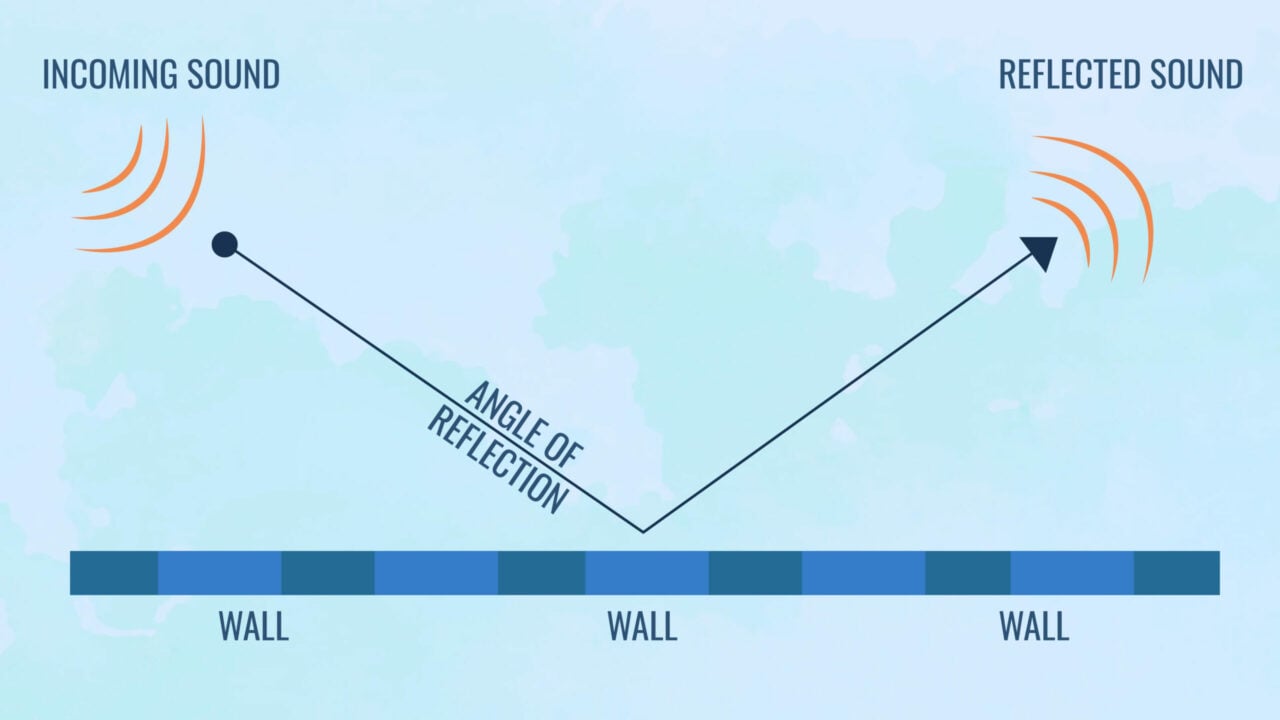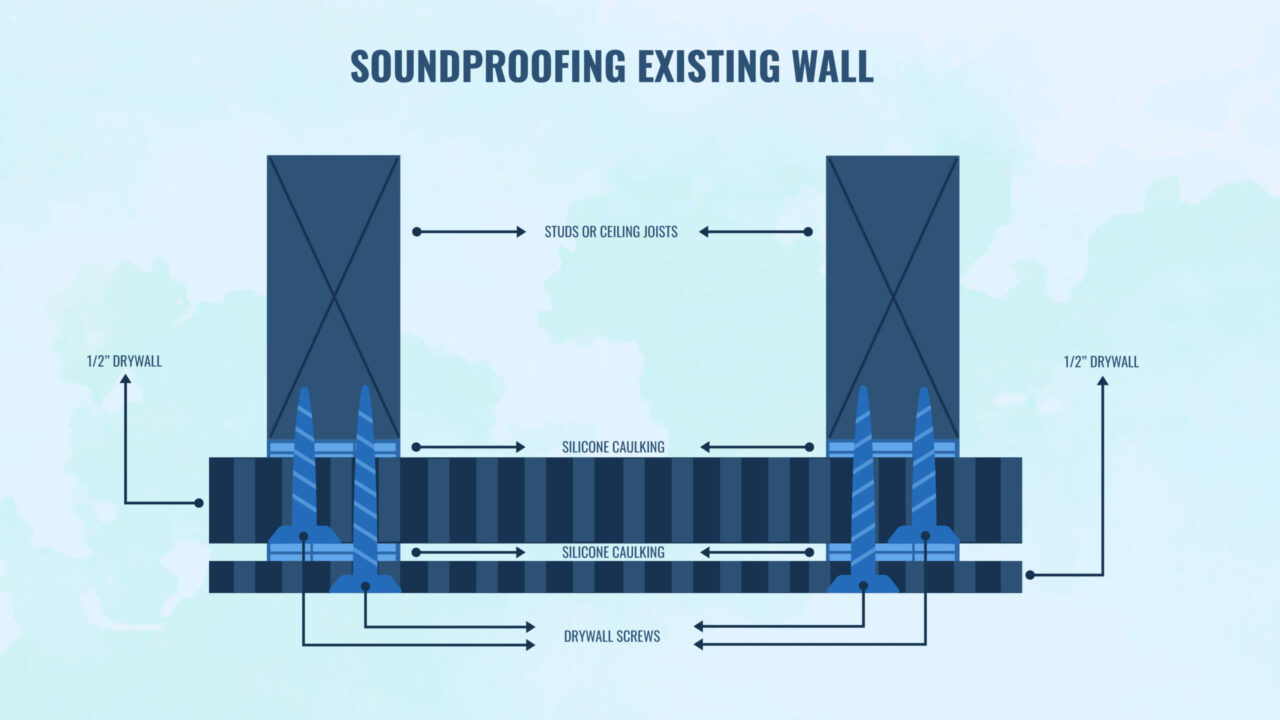Project costs will differ based on room size—costs for soundproofing range from $1,036 to $2,721. Soundproofing a room costs between $10 and $30 per square foot.
In a house, sound travels pretty substantially. Many homeowners choose soundproofing techniques to lessen noise in their homes and create a more cozy, calm living space.
Any homeowner can benefit from soundproofing, especially those with small children or noisy pets. Soundproofing projects are advantageous for homeowners.
The main objective of soundproofing is to reduce the noise that enters and leaves a particular room or even the entire house. Soundproofing is a wise house improvement to do.
Since costs vary, we’ll tell you an average of how much soundproofing costs using several soundproofing methods to stop all those annoying sound leaks and unwanted noises.
You won’t need to spend a bunch on common materials if you use any techniques to fix your noise pollution.
Ultimately, we’ll answer the question: how much does it cost to soundproof a room?
What Is the Average Cost to Soundproof a Room?
Soundproofing a space can stop annoying noises from upsetting you and others, whether you live in a noisy neighborhood or are building a home theater.
Since there are numerous soundproofing options, the price of soundproofing a room might vary greatly. To soundproof a room, budget $1,874 on average.
Depending on the project’s scope, soundproofing expenses might range from $10 to $30 per square foot for materials and skilled installation by a local soundproofing expert.
What Is the Soundproofing Cost per Square Foot?
Depending on the size of the room, soundproofing might range substantially in price.
An existing room can be soundproofed for $10 to $30 per square foot. Meanwhile, soundproofing a room yet to be built typically costs $12 to $25 per square foot.
We advise employing soundproofing contractors for the best outcomes because their unparalleled experience can ultimately save you time, money, and hassles.
When soundproofing a new room, the contractor includes the labor costs for soundproofing and adds the soundproofing material cost.
Adding a noise-proofing compound to an existing space necessitates removing the old materials to do so or placing it over an existing wall or ceiling.
This is the approximate cost of soundproofing a new or existing room:
Average Cost to Soundproof a New Room (With Labor)
Average Cost to Soundproof an Existing Room (With Labor)
New Soundproof Room Cost
Expect to spend between $12 and $25 per square foot to soundproof a new room. Soundproofing a room during construction can help you avoid extra costs.
The initial building and labor expenditures for soundproofing a new room often include soundproofing projects.
The contractor applies noise-reducing insulation throughout the foundations and frame as soundproofing in place of other, more complex soundproofing techniques.
The majority of designs already have basic soundproofing materials that reduce sound built into them, saving you the expense of additional effort. Insulation is easy to incorporate.
If you attempt to soundproof a room before construction rather than after, you will always save time and material costs and a significant noise reduction.
Existing Soundproof Room Costs
An existing room can be soundproofed for $10 to $30 per square foot. You can get modern insulated glass or sealed windows and doors.
Although it requires extra work to enter the walls and repair the plaster, adding soundproof insulation is effective. There are a few affordable methods for soundproofing an existing room.
Placing a noise-blocking door sweep, acoustic panels, adding blown insulation into an existing wall, or adding mass-loaded vinyl between two drywall layers are a few examples.
A solid core door can be installed in place of a hollow core door. Solid core doors are slabs of wood that can block sound waves from going through because they are dense.
However, since it will take more work to reach inside existing walls to add foam insulation, the cost of creating a soundproof room may increase.
There are less expensive options for tearing down walls. Homeowners occasionally create a soundproof wall over the existing wall to permanently reduce noise.

What Is the Cost to Soundproof Drywall?
Drywall is frequently put in most buildings. Although it is a crucial wall part, it can also reduce noise pollution. If you have drywall you want to soundproof, there are several options.
To dampen vibrations and fill gaps or fractures in the wall, acoustic caulk can be placed between the layers of drywall.
A resilient channel can also be added over your current drywall to improve its soundproofing.
If you have cracks in the drywall, they may contribute to sound transmission. By filling and smoothing them, you improve sound protection in your home.

You can also replace your drywall with soundproof drywall. Installing soundproof drywall reduces noise even more effectively than standard drywall.
Finally, you can install double drywall for improved soundproofing and insulation.
Soundproofing Drywall Costs
Soundproofing drywall can cost anywhere between $65 to $1,200.
What Is the Cost of Soundproofing Materials?
Numerous soundproofing materials can be used for various soundproof parts of the space. The following are some of the most typical soundproofing material costs:
Insulation
Thermal insulation is not the same as soundproof insulation. Both types of insulation work together to absorb noises. It costs $1 to $3 per square foot.
Acoustic Tiles and Acoustic Panels
Acoustic tiles and panels are frequently firmly covered in fabric and contain absorbent materials such as mineral wool, fiberglass, or polyester. These cost $5 per 4-inch square.
Drywall
Gypsum that has been improved acoustically serves as soundproof drywall. Compared to ordinary drywall, which is about $10 per sheet, this material’s price is nearly $40.
Paint
Acoustic paint, used in conjunction with panels, can reduce low-frequency noise. Painting a room costs between $2 and $4 per square foot.
Curtains
Sound-dampening curtains serve as additional barriers for windows, doors, and walls. Depending on the thickness, soundproof curtains can cost anywhere from $15 to $100.
Vinyl
Mass-loaded vinyl (MLV) is very practical. The dense material can line the inside or outside of walls, floors, and ceilings to block sound. Expect to cost between $3 to $5 per square foot.

What Is the Cost of Soundproofing Surfaces?
Your expenses could be from $15 and $4,000, depending on the surface you’re soundproofing.
To reduce the spread of sound throughout the house, homeowners frequently choose soundproof locations other than the walls.
The cost to soundproof a house will vary depending on the area and the soundproofing method. Thick walls, soundproof windows, and heavy doors can all achieve this.
Soundproofing costs go up because some spaces are more difficult to soundproof than others. The most specific room locations that can be soundproofed are included below:
Cost to Soundproof Windows
Maybe the noise is coming from outside your room. Some people may decide only to soundproof their windows to determine whether they need another soundproofing project.
Soundproofing a window can be done in several ways. To reduce outside noise, acoustic caulking fills in spaces between window frames.
Another inexpensive way to add a layer of insulation and noise reduction is installing window seals.
A soundproof window plug offers an airtight seal that prevents noise from entering and leaving a space. It muffles sound waves like passing cars, dog barking, and loud neighbors.
For more quiet living spaces, you can also use velvet, vinyl, and sound-dampening curtains to absorb sounds and noise transfer.
Last but not least, installing soundproof windows is the most effective but expensive way to soundproof a window.
If you have the necessary tools, you can do these tasks yourself. The alternative is to employ a specialist to complete them.
Depending on the technique used, soundproofing a window might also be expensive. Installing soundproof curtains can be done affordably for less than $100.
Purchase brand-new soundproof windows if you want to maximize soundproofing. You’ll pay between $300 and $1,500 for each window.
Nevertheless, the typical cost to soundproof a window is between $15 and $1,500.
The Cost of Soundproofing a Window

Cost to Soundproof Doors
Door soundproofing is another option to lessen outside noise. Before doors, homeowners make smaller, less expensive renovations to evaluate their room’s soundproofing.
To stop noise from entering via the bottom of doors, acoustic door thresholds are placed on floors close to the doors.
To close the threshold gap where sound can enter the room, a door sweep can also be fastened to the bottom of the door.
A soundproof blanket composed of thick, sound-absorbing materials is an additional choice. They close the door and increase sound insulation.
Another choice is mass-loaded vinyl, which absorbs sound waves and lessens vibrations.
You can hang acoustic panels over the door frame to lessen noise transmission and eliminate reverb,
A solid core door can be used instead of a hollow core door to increase soundproofing. The wood pulp core of solid core doors is covered by wood, vinyl, or MDF.
The most costly and effective soundproofing option is installing soundproof doors, which can be a door with a sound-absorbing inner layer or a sliding glass door.
Depending on the choice, door soundproofing can cost anywhere from $20 to $4,000.
The Cost of Soundproofing a Door
Cost to Soundproof Floors

Maybe your problem is impact noise instead of airborne noise. A floor soundproofing project might be just what you are looking for then.
A sound-dampening rug can provide a quick and simple solution for soundproofing your room against impact noise.
The best soundproofing for an unfinished room may be achieved by using resilient underlayment, mass-loaded vinyl, or soundproof foam within the floor.
Carpet underlayment, which has a mass-loaded vinyl barrier on one side and a durable acoustic foam layer on the other, works well for carpeted floors.
Soundproof floor underlayment is placed beneath carpet flooring to act as a soundproofing barrier and lessen noise when walking on.
A smart way to build a barrier to reduce obtrusive room noise is to add a rubber soundproof carpet pad. Similar to interlocking floor mats, they offer a soundproofing cushion.
Instilling blown sound insulation composed of cellulose or fiberglass is an additional alternative for soundproofing floors.
Finally, you can insulate floors with green glue. This substance is applied to homes’ walls, ceilings, and other surfaces to reduce echoes.
Depending on how many square foot your floor is, soundproofing flooring typically costs between $100 and $1,500.
Cost to Soundproof Walls
Wall soundproofing might help with airborne noise in your home. Some of the same soundproofing techniques suggested for doors can be applied when soundproofing walls.
Rockwool sound insulation is a type of stone wool insulation that can absorb sound and lessen noise in walls and floors
Mineral wool batts are also used to reduce noise in interior walls and floors with steel studs. They are great insulators, keeping homes warm during the winter seasons
Acoustic foam and textured wall panels are options for soundproofing your walls. Each of these is priced per square foot.
Mass-loaded vinyl, placed between layers of existing drywall to lessen sound transmission, is a wonderful alternative for noise suppression.
Acoustic panels can successfully regulate and reduce echoes since they cover the existing wall and absorb sound.
Acoustic foam panels are helpful when you want to reduce sound in a home studio, even though they resemble egg curtains.
Additionally, you can eliminate mid-level frequencies like tinkling, ringing, and echoing by adding soundproof paint.
Decoupling separates a wall’s two sides so that sound cannot easily pass through them. This layer of air reduces sound, as sound transmits more easily in solids than in gases.
Another choice is building a new block wall in front of the first one and leaving a small space between them filled with foam to absorb noises in brick or concrete walls.
Your expenses will change based on the approach you choose for wall soundproofing. It can range between $80 to $400.
The Cost of Soundproofing a Wall
You may want to check our apartment wall soundproofing article if you live in an apartment.
Cost to Soundproof Ceilings

Solutions for ceiling soundproofing are particularly well-liked in homes with basements that suffer from impact noise or hardwood floors that absorb sound better than carpet.
Because foam panels absorb echoes and improve overall sound quality, homeowners frequently install them on existing roofs in recording studios, theaters, and entertainment spaces.
To create quieter living environments, construction workers can use flexible rolls of mass-loaded vinyl to reduce airborne noise.
Resilient sound isolation clips can be installed on the ceiling joists. These effectively raise your ceiling’s sound transmission class, or STC, increasing noise reduction and sound quality.
Adding green glue, a soundproofing substance that creates a damping system between two stiff drywall layers, is an additional technique.
To produce a second layer of insulation, you can add double drywall. You can even apply a soundproofing substance between the layers to reduce noise.
A single room’s ceiling soundproofing can cost anywhere between $150 to $1,200.
The Cost of Soundproofing a Ceiling
How Much Does It Cost to Soundproof a Room: Labor Costs
Many of the soundproofing projects on this list are simple and inexpensive to complete on your own.
Many brands sell rolls, panels, and tiles of vinyl that are simple for homeowners to install. You will solely be responsible for the materials’ cost in these situations.
You can do that without a contractor if you’re hanging wall panels or acoustic panels. But for more complex projects, it’s best to call a professional.
A soundproofing specialist must be hired if you have to take down any walls, floorboards, or portions of your ceiling.
These building projects could interfere with plumbing or electrical wiring and necessitate building permits.
Therefore, the labor cost should also be considered when estimating the overall cost of soundproofing and the location and soundproofing material.
Any significant soundproofing projects like adding extra drywall, installing insulation, or converting to soundproof variants should be handled by a specialist
A general contractor should cost between $15 and $60 per hour, whereas a handyperson should cost between $12 and $45.
The typical cost of soundproofing labor varies depending on the project’s size and ranges from $190 to $300.
Labor will probably cost at least $300 for a project to soundproof a room with a material cost of at least $1,600.
However, it’s crucial to remember that other factors, such as the company’s reputation, location, and season, could affect labor costs.
Most contractors bill by the hour, while some stipulate a minimum number of hours needed to do the project.
To know more about DIY and materials, you should check out our article on how to soundproof a room.
Why Should You Soundproof a Room?
The effects of noise pollution can be extremely detrimental, from a noisy neighbor, a bustling main highway, or intrusive sounds between rooms.
You and your neighbors will benefit from soundproofing your home if you appreciate a calm environment for yourself and your neighbors.
A room is soundproofed to either keep noise inside or keep it outside. Soundproofing enhances the quality of life in bedrooms, offices, and entire homes in crowded districts.
However, soundproofing is added to home theaters, studios, and gyms to keep noise inside the building and away from the neighbors and family.

Frequently Asked Questions (FAQs)
Got more questions about the cost of soundproofing a room? Here are our most frequently asked questions about the topic.
Can You Soundproof a Room Without Damaging It?
There are many ways to soundproof a room without damaging it. Many of the methods mentioned above do not damage your walls and are just placed on top of the surface
Some examples include panels, tiles, acoustic paint, mass-loaded vinyl, soundproof rug, curtains, green glue, inserts, acoustic caulk, and foam.
Does Soundproofing Work for Noisy Neighbors?
If you get a soundproofing job done, it will eliminate all the noise and noise pollution from your neighbors. You cannot place a value on a calm and quiet mind.
To completely silence the noise from the neighbors, soundproofing the walls, doors, and windows should be more than sufficient.
The airborne and impact noises originating outside your house or the adjacent room are muffled by soundproofing materials.
What Is the Best Soundproofing Material?
The best soundproofing materials depend on the noise you want to block and the area you want to soundproof.
Mass-loaded vinyl is a robust, multipurpose substance that absorbs sound wherever it is used. It works well around pipes, walls, floors, ceilings, and hollow doors.
Foam sprayed from a container and used as insulation for walls is known as soundproofing foam. It works best with already-existing floors and walls between levels.
Gaps in walls, doors, and windows can be filled with acoustic caulk, which reduces noise vibrations. It works best for cracks in walls, ceilings, doors, and window frames.
If you want to know more, here is our article on the best soundproofing material.
How Much Does Soundproofing Your Chimney Cost?
The soundproofing cost of a chimney varies from $35 to $600, depending on the approach. A flueblocker, chimney balloon, or chimney cap are all effective ways to soundproof a chimney.
The sound of the fireplace crackling, the wood exploding, and the air whooshing reverberates throughout the home if the chimney is not adequately insulated.
Additionally, your home may become disturbed by outside noises such as weather, animal, and neighbor noises, which can disturb the peace.
Because it stops heat from escaping through the chimney, chimney soundproofing significantly enhances energy efficiency in your home.
Conclusion
When several sorts of noise interrupt your quiet at home, soundproofing becomes necessary. Since noise can originate from many places, there isn’t a universal remedy.
To effectively soundproof a space, meticulous planning and implementation are required. Additionally, you want to ensure the process doesn’t cost too much money.
Based on the breakdown above, you should have a general estimate of how much you will spend on your soundproofing project.
Remember that the size of your room will also need to be considered since it will considerably impact your overall soundproofing cost.


